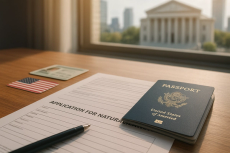
Blogs • March 3, 2026 • 9 Min
Best Countries for Startups in 2026
Where you base your startup still matters. It affects how quickly you incorporate, how investors perceive you, how much tax you pay, and how easy it is to hire and scale. But in 2026, the decision is no longer as binary as it once was. You can incorporate in one country, operate in another, and hire across ten more. Headquarters, tax residency, and talent strategy do not have to overlap. The smartest founders separate these decisions deliberately. This guide breaks down how to choose the right country for your startup, what factors actually move the needle, and which jurisdictions consistently remove friction rather than create it. How Do You Choose the Right Country for Your Startup? There is no single “best” country for startups. The right choice depends on your stage, industry, funding strategy, and hiring model. A fintech company navigating regulatory approval will prioritise legal clarity and financial infrastructure. A bootstrapped SaaS founder may prioritise runway, cost control, and flexibility. A deep-tech startup may need proximity to research institutions and specialised engineering talent. Before comparing countries, answer a few structural questions: How fast do you need to incorporate and become operational? How sensitive is your runway to corporate tax and employment costs? Will investors expect a specific legal structure? Do you need access to a local talent market, or will you hire globally? How complex are local labour laws as you scale? Is proximity to customers or capital critical? The strongest decisions usually separate two things: Where you incorporate Where you hire These no longer need to be the same. What Makes a Country Startup-Friendly in 2026? “Startup-friendly” is often used loosely. In practice, it comes down to how much friction a country removes at each stage of building a company. Below are the factors that consistently shape founder decisions in 2026. 1. Speed of Incorporation Time matters early. Some jurisdictions allow full incorporation, tax registration, and bank account setup within days. Others require multiple agency approvals and longer processing timelines. Delays at this stage affect: Investor onboarding Contract execution Payroll setup Regulatory licensing Faster incorporation reduces operational uncertainty. 2. Legal Structure and Investor Familiarity Not all company structures are equally recognised by international investors. For example: Delaware C-Corporations are widely understood in venture capital markets. UK limited companies are familiar to European investors. Singapore private limited companies are commonly used for Asia-Pacific operations. Investor comfort with the legal framework often influences fundraising efficiency. 3. Corporate Tax Framework Headline corporate tax rates do not tell the full story. Founders should assess: Effective tax rates after deductions Tax treatment of reinvested profits Capital gains and dividend treatment Double tax treaty networks A predictable tax system is usually more valuable than a low nominal rate. 4. Labour Law Flexibility As teams grow, employment regulation becomes critical. Key considerations include: Termination procedures Mandatory notice periods Social contributions Overtime and working-time rules Contractor classification risks Rigid labour frameworks increase long-term operational risk. 5. Access to Skilled Talent Some countries offer deep pools of specialised talent. Others require importing skills. Depth matters more than cost. A country with strong AI engineers, fintech compliance specialists, or biotech researchers can accelerate product development in ways lower-cost markets cannot. 6. Immigration Pathways for Founders and Key Staff Founder visas, startup visas, and fast-track work permits influence relocation decisions. Countries such as: Singapore Canada Portugal United Arab Emirates have structured pathways designed to attract entrepreneurs and skilled workers. Immigration flexibility directly impacts leadership mobility. 7. Infrastructure and Banking Operational reliability often goes unnoticed until it fails. Digital government services, predictable banking systems, stable internet infrastructure, and efficient public administration reduce daily friction. Founders rarely rank this factor first, but it influences execution speed. 8. Compatibility With Global Hiring In 2026, many startups are distributed from day one. Countries that: Recognise remote employment Have clear contractor rules Integrate easily with international payroll systems are easier to scale from. This factor has become significantly more important over the past five years. Most Startup-Friendly Countries in 2026 Now let’s look at them individually, with context. United States If raising venture capital is central to your strategy, the U.S. remains structurally dominant. Delaware C-Corporations are globally recognised, and investor documentation is standardised. What makes it powerful: Largest venture capital market globally Mature exit environment Large domestic customer base Operational reality is different. Healthcare costs, employment liabilities, and immigration planning require structure from day one. The U.S. works best when scale and capital access justify complexity. Singapore Singapore is built for administrative efficiency. Incorporation can be completed in days, and government processes are highly digitalised. Why founders choose it: Clear regulatory framework Competitive corporate tax with incentives Strategic gateway to Southeast Asia The domestic market is small, so most Singapore-based startups expand regionally from the start. United Kingdom The UK offers one of the simplest company formation systems in Europe. English contract law familiarity also reduces friction with international investors. Strengths include: London’s financial and fintech depth Broad angel and early-stage funding presence Straightforward incorporation process However, higher corporate tax and London operating costs must be factored into long-term projections. United Arab Emirates The UAE has become a serious founder destination over the past decade. Free zones offer structured incorporation options, and infrastructure is built for international business. Key structural points: 9% federal corporate tax introduced in 2023 (applies above AED 375,000 taxable income) No personal income tax Strong global flight connectivity Free zone selection matters. Not all jurisdictions offer identical benefits, so structure must match the business model. Estonia Estonia’s digital governance model allows founders to operate remotely with minimal bureaucracy. What stands out: Corporate tax applied only when profits are distributed Fully online company management E-Residency programme for non-residents The trade-off is a smaller local talent base, meaning most scaling happens internationally. Portugal Portugal offers access to the EU market combined with moderate operating costs compared to Western Europe. Founders often consider Portugal for: EU legal presence Startup visa pathways Growing Lisbon tech scene Corporate tax stands at 21% nationally, with possible municipal surtaxes. The funding ecosystem is developing but smaller than the UK or Germany. Canada Canada balances immigration accessibility with strong research capacity, particularly in AI and life sciences. Notable advantages: Federal corporate tax at 15%, plus provincial rates Strong university research pipeline The venture capital market is smaller than the U.S., but Canada remains attractive for research-led companies. Should You Separate Your HQ and Hiring Strategy in 2026? In 2026, the answer is often yes. Ten years ago, startups typically incorporated, hired, and operated in the same country. Today, that alignment is no longer required. Legal structure, tax residency, talent location, and founder residence can be planned independently. What Your HQ Actually Determines Your headquarters jurisdiction affects: Legal structure and shareholder rights Investor familiarity Corporate taxation Regulatory environment Exit pathways It does not automatically determine where your employees must sit. For example, many venture-backed startups incorporate in the United States for legal clarity, while building engineering teams in Eastern Europe or Asia. Others establish holding companies in Singapore or the UAE while hiring across multiple regions. The HQ decision is about structure, not geography. What Hiring Location Determines Where you hire affects: Salary levels and employment costs Labour law complexity Time-zone coverage Access to specialised skills Operational scalability This is often the biggest lever on burn rate. For instance: A U.S.-based startup hiring senior engineers domestically may face six-figure salary benchmarks. The same startup hiring in Poland or India can extend runway significantly while maintaining technical depth. The decision is financial and operational, not symbolic. When It Makes Sense to Separate Separation is most common when: You are raising venture capital and need a familiar legal structure. You operate remotely or sell globally from day one. Talent availability in your incorporation country is limited or expensive. Your team is already geographically distributed. Early-stage SaaS and product-led startups often benefit the most from this flexibility. When It May Not Make Sense In some cases, consolidation is simpler. Highly regulated sectors such as fintech or biotech may require local licensing. Hardware startups with physical manufacturing dependencies may need geographic alignment. Businesses reliant on government contracts often require domestic presence. In these cases, HQ and operations may need to overlap. The 2026 Reality The strongest founders now treat: Incorporation as a legal design decision Hiring as a cost and talent optimisation decision Residence as a lifestyle decision These three do not have to match. Choosing intentionally, rather than defaulting to your home country, creates structural advantage. Choosing the Right Startup Base in 2026 There is no single best country for startups. There is only the country that aligns with your stage, capital strategy, and hiring model. In 2026, founders who think structurally gain an advantage. Incorporation defines your legal and investor framework. Hiring location defines your burn rate and access to talent. Residence shapes your lifestyle and personal exposure. These decisions do not need to match. The right setup is intentional. It reduces friction rather than adding it. If you are evaluating where to incorporate, relocate, or build your team, speaking with experienced advisors can prevent costly structural mistakes. Our team works with founders navigating these decisions across jurisdictions and can help you assess which combination makes sense for your specific model. FAQs on the Best Countries for Startups in 2026 What is the best country to start a startup in 2026? There is no universal best country. The right choice depends on your business model, funding strategy, and hiring plan. The United States, Singapore, and the United Kingdom are often chosen for investor familiarity, while Estonia, the UAE, and Portugal are selected for administrative efficiency and flexibility. Which country has the lowest corporate tax for startups? Corporate tax varies by structure and incentives. The UAE applies a 9% federal corporate tax above the taxable threshold introduced in 2023. Singapore’s headline corporate tax rate is 17%, with startup exemptions available. Estonia taxes corporate profits only when they are distributed. Effective tax rates depend on structure, not just headline numbers. Is it better to incorporate in the U.S. or Europe? It depends on your funding strategy. U.S. investors often prefer Delaware C-Corporations due to legal familiarity. European incorporation may be more practical for EU-focused businesses or founders relocating within Europe. The decision should align with capital strategy and operational footprint. Can I hire internationally without incorporating in each country? Yes. Many startups hire globally through compliant employment structures such as local entities or third-party employment solutions. This allows founders to separate where they incorporate from where they build their teams. What factors matter most when choosing a startup location? The most important factors typically include: Legal structure and investor familiarity Corporate tax framework Labour law flexibility Access to skilled talent Immigration pathways for founders The strongest decisions are based on long-term scalability rather than short-term cost alone. References U.S. Small Business Administration. Business registration and incorporation guidance. Referred from: https://www.sba.gov/business-guide/launch-your-business/register-your-business State of Delaware – Division of Corporations. Corporate formation framework. Referred from: https://corp.delaware.gov Inland Revenue Authority of Singapore (IRAS). Corporate tax rates and startup tax exemptions. Referred from: https://www.iras.gov.sg/taxes/corporate-income-tax UK Government (GOV.UK). Set up a limited company. Referred from: https://www.gov.uk/set-up-limited-company Government of the United Arab Emirates – Ministry of Finance. Corporate Tax framework. Referred from: https://mof.gov.ae/corporate-tax Government of Portugal – ePortugal Portal. Business incorporation and startup visa information. Referred from: https://eportugal.gov.pt
Latest Articles













PORTUGAL | RESIDENCY BY INVESTMENT
READY TO APPLY?
Citizenship enquiry

